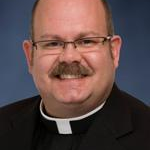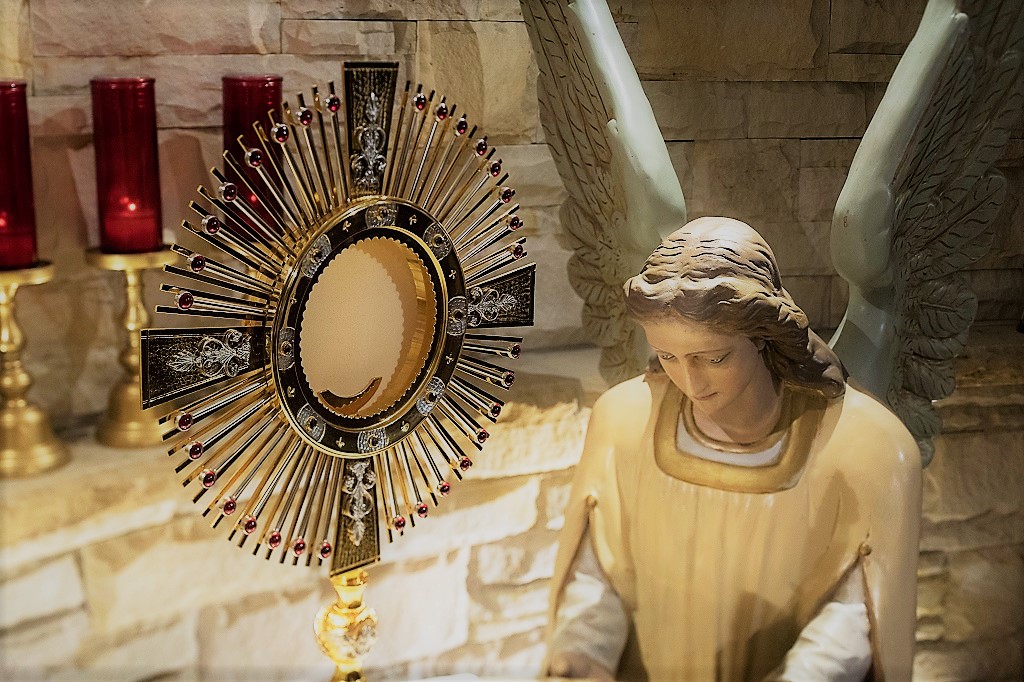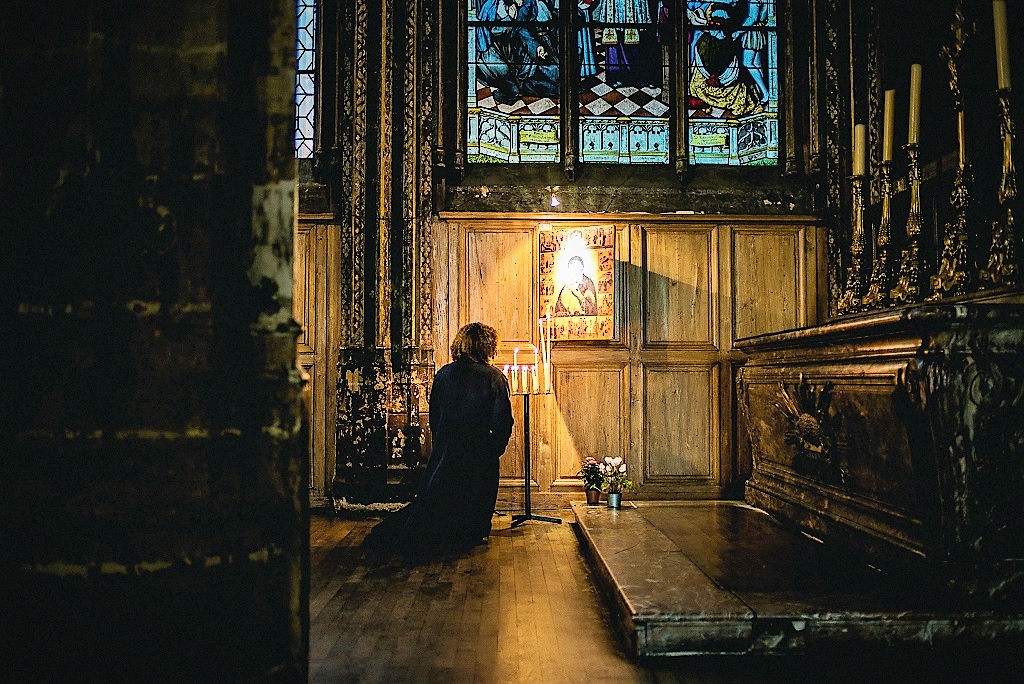There is hardly any Christian or even non-Christian who has not heard the two main commandments of the Christian faith: love God and love your neighbor. I am not sure people would say it exactly in that order, but if we were to ask our contemporaries how they would sum up the requirements of Christianity, more or less that’s the kind of answer we would get.
Today’s Gospel reading provides us with a version of it: The first is this: Hear, O Israel! The Lord our God is God alone! You shall love the Lord your God with all your heart, with all your soul, with all your mind , and with all your strength. The second is this: You shall love your neighbor as yourself (Mk 12:29-31)
The first and most important thing to notice in Jesus’ answer to the scribe’s question is what most people overlook. It is something we easily slip over when we mention this two-fold commandment: “Hear, O Israel! Shema, Israel!” Have we noticed that the ten commandments actually start with this first invitation, like a necessary prelude, almost a commandment in itself? It is a solemn request, coming from God.
Listening to God, therefore, is like a pre-commandment: a condition, a mindset we have to come to in order to fulfill the commandments that follow. Listening becomes the key to understanding their true nature. How can there be love of God “with all your heart, with all your soul, with all your mind and with all your strength” if you do not first welcome God through the gate of your inner ears, of your heart? How can I love someone I do not know? Someone I have not encountered? Someone I have not listened to?
Furthermore, it is through deep listening to God, especially in prayer, that God enables us to love him and our neighbor with such total love. In my spiritual journey, I have found that one of the most recurrent obstacles in spiritual life – both for Christians who struggle to go deeper and for non-Christians who are attracted to Christianity – is this kind of thought: “This is all great, but it’s just a lofty ideal! Who can attain this perfect love demanded of me? God’s commandments are beautiful but they are too hard to live out.” People give up. Who needs one more burden in our already busy and complicated life? One more heavy requirement? The truly sad spiritual truth is that we give in to this false image of a very demanding God. It is an idol we may inadvertently worship.
If you think about it, a God who is only demanding – or simply demanding first and foremost – would be an unjust God. God cannot be unjust, not only because that would contradict his very nature, but because he is a Father. No good father or mother would first and foremost demand something of their children, without giving first! The very fact of the children’s existence is proof that first comes love, the gift. The children wouldn’t exist had not mom and dad loved each other in that way that is a total gift of self, not just of heart but of body as well, open to the Creator’s gift of life. First comes the gift, then comes the requirement. First comes Love, then the response of Love to that first gratuitous Love. “If you then, who are evil, know how to good give good things to your children, how much more will your Father who is in heaven give good things…” (Mt 7:11)
Too many Christians live their faith with a kind of underlying disappointment of not being able to live up to the requirements of the Faith. How does this burdensome feeling measure up against the Christian Faith as “Good News?” Could Christ have come only to make us feel worse? Unhappier? Could He have brought only more burdens to place on our shoulders? Where is the “Good News” then? “Here I am, stuck in my poverty, with my own limits, while God is far away, as lofty in the high heavens as his commandments.” Who needs this kind of faith? How can we evangelize the world if we live under such a burden? The world needs someone to free them from their burdens, not to add more.
The answer to this dilemma is that we develop a spiritual life in which God is the Giver, that the gift comes first. Grace enables us to live out the commandments; this becomes “our daily bread.” In today’s responsorial psalm God says: “I relieved his shoulder from the burden” (Ps 81:6). God relieves us from our burdens by means of our listening. When we open our hearts to him in prayer, our inner ears to his Word, that is when we are made able to totally love God and our neighbor as ourselves.
“Listen, O Israel” is therefore the key, the gateway to living the commandments. The Father seems to say to us, his sons and daughters, in the gift of the Commandments: “If you listen, my son, if you open wide your ear to my words, I will dwell in you through my only begotten Son, my Word. And the Word will transform you so that you may become my image and likeness, perfect love.”
Will you look at the Father from now on through these eyes? Will you pray in this way from now on? Will you see in listening to him the very way to living out his love?
 Fr. Peter Damian, 38, is a native of Romania. Growing up under Ceausescu’s Communist regime, in a Christian Orthodox family, he became Catholic at age 19 after a deep search for Truth. Providence took him to Italy, where he attended seminary in the Diocese of Massa Carrara-Pontremoli, followed by post-seminary studies in Rome, at the Pontifical Lateran University. He was ordained a priest on April 2nd, 2005, the very same day St. John Paul II went to Heaven.
Fr. Peter Damian, 38, is a native of Romania. Growing up under Ceausescu’s Communist regime, in a Christian Orthodox family, he became Catholic at age 19 after a deep search for Truth. Providence took him to Italy, where he attended seminary in the Diocese of Massa Carrara-Pontremoli, followed by post-seminary studies in Rome, at the Pontifical Lateran University. He was ordained a priest on April 2nd, 2005, the very same day St. John Paul II went to Heaven.
After 8 years of priestly service in Italy, he felt called to serve God in the Diocese of Grand Rapids, Michigan. He currently serves as Associate Pastor at Our Lady of Consolation Parish in Rockford, MI. Fr. Damian has worked in priestly formation and co-directed spiritual retreats in the Ignatian tradition. He enjoys integrating his formation with studies in Spirituality, Catholic Social Teaching, ecumenism, foreign languages and aviation.



 Author Nancy Shirley is a grateful child of God, wife, mother, nana, and nursing professor. My husband and I met at church and have walked this extraordinary journey together experiencing CEC in 2004 and growing more committed to our beliefs. In addition to my husband, I am blessed with a wonderful daughter and son, who in turn are blessed with wonderful spouses. My son’s four children bring us all endless joy and delight. I am on the faculty at Creighton having taught nursing here from 1980-1989 and returning “home” in 2003 to teach nursing at all levels and to administer the undergraduate program. [Today’s reflection is used with permission from Creighton University.]
Author Nancy Shirley is a grateful child of God, wife, mother, nana, and nursing professor. My husband and I met at church and have walked this extraordinary journey together experiencing CEC in 2004 and growing more committed to our beliefs. In addition to my husband, I am blessed with a wonderful daughter and son, who in turn are blessed with wonderful spouses. My son’s four children bring us all endless joy and delight. I am on the faculty at Creighton having taught nursing here from 1980-1989 and returning “home” in 2003 to teach nursing at all levels and to administer the undergraduate program. [Today’s reflection is used with permission from Creighton University.]
 Amy Oatley is a wife, mother, and Secular Franciscan (OFS), passionate about social justice, advocating for the dignity of every human life. She encounters Christ through Prison and Jail Ministry in the Diocese of Grand Rapids and as a Sidewalk Advocate for Life. A journalist for the past thirty years, she is currently a freelance writer for FAITH Magazine and works at St. Thomas the Apostle Parish. Her home parish is Our Lady of Consolation in Rockford, Michigan.
Amy Oatley is a wife, mother, and Secular Franciscan (OFS), passionate about social justice, advocating for the dignity of every human life. She encounters Christ through Prison and Jail Ministry in the Diocese of Grand Rapids and as a Sidewalk Advocate for Life. A journalist for the past thirty years, she is currently a freelance writer for FAITH Magazine and works at St. Thomas the Apostle Parish. Her home parish is Our Lady of Consolation in Rockford, Michigan.
 Fr. Ron Hutchinson
Fr. Ron Hutchinson
 Elise Hilton is an author, blogger and speaker. Her role at Diocesan Publications is Editor & Writer with the Marketing Team. She has worked in parish faith formation and Catholic education for over 25 years. A passionate student of theology, Elise enjoys sharing her thoughts on parish communication, the role of social media in the Church, Franciscan spirituality and Catholic parenting. To enquire about booking her as a speaker, please contact her at
Elise Hilton is an author, blogger and speaker. Her role at Diocesan Publications is Editor & Writer with the Marketing Team. She has worked in parish faith formation and Catholic education for over 25 years. A passionate student of theology, Elise enjoys sharing her thoughts on parish communication, the role of social media in the Church, Franciscan spirituality and Catholic parenting. To enquire about booking her as a speaker, please contact her at 

 I am the Legal Reference Librarian at the Creighton University Law School Library and have been here since August of 2007. I also teach Legal Research to first year law students and Advanced Legal Research to second and third year law students. My wife, Deb, and I have been married since 1970. She grew up in Oklahoma City and I migrated south from southwestern Pennsylvania. God has blessed us with three children and four living grandchildren. I spent the first thirty years of our marriage as a minister so our family moved a lot. We have lived in several states, including Pennsylvania, Oklahoma, Texas, Colorado, and California. We tend to enjoy wherever we happen to be at the time. I enjoy walking, reading, listening to audio books, playing with my Pekingese, Max, and seeing my grandkids grow up. I am a Catholic deacon, having been ordained by Archbishop George Lucas on May 5, 2012. My wife Deb and I are parishioners at St. Gerald in Ralston, Nebraska. [This blog has been generously shared by
I am the Legal Reference Librarian at the Creighton University Law School Library and have been here since August of 2007. I also teach Legal Research to first year law students and Advanced Legal Research to second and third year law students. My wife, Deb, and I have been married since 1970. She grew up in Oklahoma City and I migrated south from southwestern Pennsylvania. God has blessed us with three children and four living grandchildren. I spent the first thirty years of our marriage as a minister so our family moved a lot. We have lived in several states, including Pennsylvania, Oklahoma, Texas, Colorado, and California. We tend to enjoy wherever we happen to be at the time. I enjoy walking, reading, listening to audio books, playing with my Pekingese, Max, and seeing my grandkids grow up. I am a Catholic deacon, having been ordained by Archbishop George Lucas on May 5, 2012. My wife Deb and I are parishioners at St. Gerald in Ralston, Nebraska. [This blog has been generously shared by 
 Allison Gingras, founder
Allison Gingras, founder 



